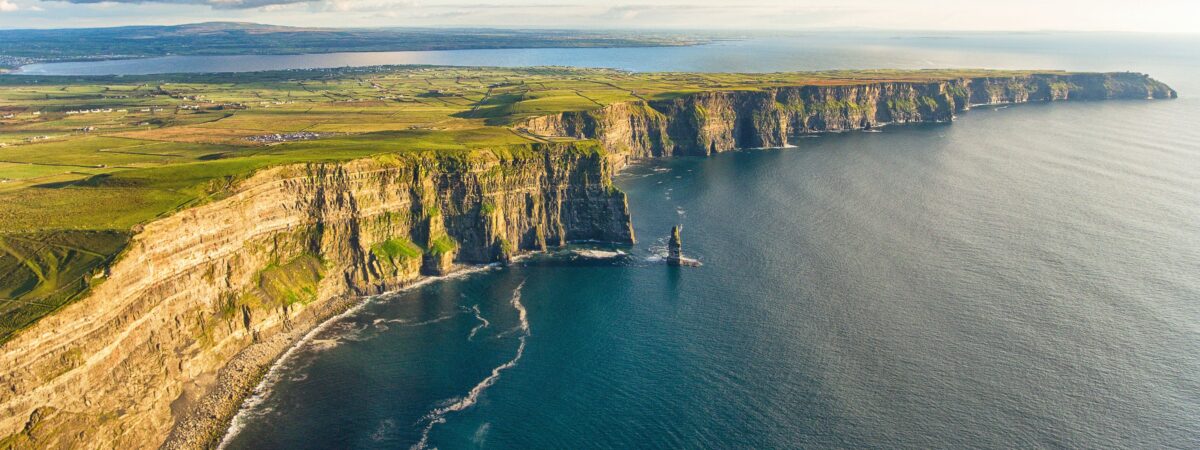
Ireland is a surprising country, full of surprises… Despite its small size, the country’s culture and unspoilt beauty shine throughout the world! Whether it’s for its music, the friendliness of the Irish, or its emblematic tourist sites, the Emerald Isle has many assets and attracts millions of visitors every year!
Want to find out more? If you’re interested in discovering it, here’s some unusual information to help you prepare for your trip!

The Cliffs of Moher – © aljazvidmar
This may surprise you… But it’s true. Ireland has an extensive Atlantic coastline. So much so, that it boasts the longest coastal road in the world! The “Wild Atlantic Way” (as it is officially known) is estimated to be over 2,500 km (or 1,600 miles) long.
It crosses more than 9 Irish counties, offering a wide variety of landscapes. Cliffs, beaches, mountains, incredible bays, deep forests, moors, desert landscapes, ruined castles, dolmens and other megaliths… This tour reveals Ireland’s unexpected and always magnificent facets… where nature imposes itself in all its majesty!
The road is magnificent, punctuated by spots where you absolutely must stop. We recommend renting a car or taking your own by ferry for greater freedom. You can do it at your own pace, and discover a country on a human scale, with colorful villages and impressive landscapes!

Pints of Guinness beer – Zach Dischner – cc
The pace can seem hellish… But it lives up to the success of Ireland’s biggest brewery! The Guinness brewery (part of the Diageo group) produces a mind-boggling quantity of its eponymous dark beer.
It’s said that over a million pints are drunk every day in Ireland!
But contrary to popular belief, Ireland is not the country with the highest consumption of the famous brown stout… Nigeria is unquestionably the world’s biggest consumer! Available there since 1827, Irish beer is an institution, and is drunk a little differently than in Ireland… Nigerians don’t drink it out of a pint, but directly from the neck of a glass bottle! A rather decried practice on the green Erin… (where a pint is mandatory!)

A Halloween pumpkin – © Sonja Birkelbach
You may have thought that Halloween was originally a purely American holiday… But the facts are true: this festival has its roots in an Irish tradition known as “Samain”.
In fact, it’s an Irish tradition dating back over a thousand years. Back in the day, the Celts believed that on the eve of Halloween, the spirits of the dead visited the mortal world. To ward off evil spirits, they dressed up and lit bonfires. Known as Samain, meaning “dark half”, this festival also marked the beginning of winter.
Today, the tradition has changed somewhat. Imported into the United States as a result of strong Irish emigration (following the Great Famine), Samain was eventually modernized to give rise to Halloween.
There are still a few markers of the original Samain: bonfires, pumpkins, references to Jack O’Lantern… etc.
Londonderry’s Halloween Carnival, on the banks of the River Foyle, is Ireland’s oldest Halloween celebration, as well as Ireland’s biggest street party.

Saint Patrick – jaqian – cc
In Ireland, Saint Patrick’s Day is no joke. It has to be said that this man is praised by the Irish for having evangelized Ireland in the 5th century. There’s no shortage of stories and legends about it, and the Irish are still very attached to this part of their history (let’s not forget that the country is still strongly Catholic).
He is said to have driven the snakes out of Ireland, taught the concept of the Holy Trinity to King Aengus using a three-leaf clover… and thus to have converted the Irish to Christianity!
His history is so important in Ireland, that the Saint is celebrated every March 17 on “St. Patrick’s Day”, a major national event that allows everyone to celebrate their pride in being Irish. Every symbol is used: the shamrock, the leprechaun, the Saint’s emblems… In short: St. Patrick’s Day is evocative of Ireland, its culture and its folklore…
But did you know that Saint Patrick wasn’t originally Irish? The man is actually Scottish… or Welsh, depending on the theory! From his original name, ” Maewyn Succat,” the Saint was born in Brittany… But theories differ: some say he was born in Wales near Carlisle… while others suggest he was born in the Scottish village of Old Kilpatrick.
The story goes that he was captured by the Irish and sold into slavery, forced to work as a shepherd in County Antrim (Northern Ireland). After a few years of hard work, he managed to escape and return home.
On his return, the Pope entrusted him with an important mission: to evangelize Ireland… That’s why he decided to return to Ireland to begin a long process of conversion among the pagan Irish population… Fascinating, isn’t it?